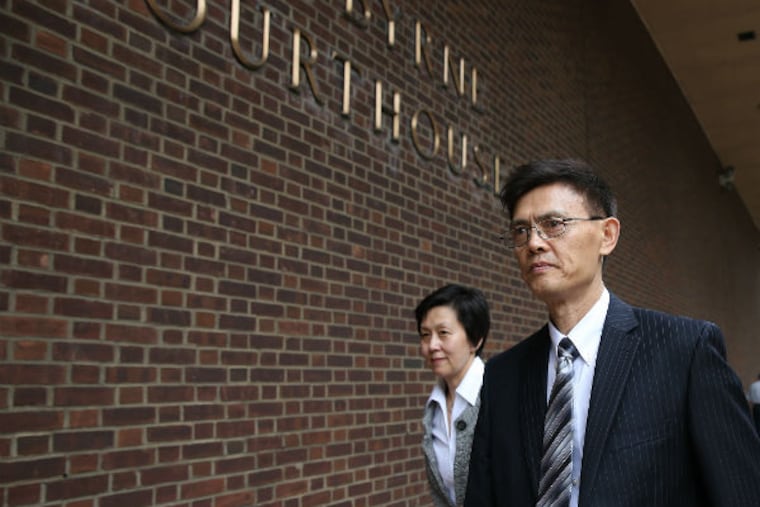Feds drop charges against Temple prof in alleged tech-share with China
Xiaoxing Xi, the former chairman of Temples physics department, was indicted by a grand jury on wire-fraud charges in May.

FEDERAL prosecutors yesterday filed a motion to dismiss an indictment against a Temple University physics professor who had been accused of sharing sensitive technology with his native China.
Xiaoxing Xi, 57, the former chairman of Temple's physics department, had been indicted by a grand jury on four counts of wire fraud in May.
In their motion, prosecutors wrote that since the indictment, "additional information came to the attention of the government" and "it is in the interests of justice to dismiss the indictment without prejudice in order to pursue this additional information."
The U.S. Attorney's Office in Philadelphia declined to elaborate yesterday. Spokeswoman Patty Hartman said the office would not comment beyond what was in the written motion.
By seeking to dismiss the indictment "without prejudice," prosecutors are leaving open the possibility that charges could be refiled at a later date.
Before charges are dismissed, U.S. District Judge R. Barclay Surrick, who is presiding over the case, still must sign off on the motion, which was filed late yesterday afternoon.
Xi, of Penn Valley, a naturalized U.S. citizen, has pleaded not guilty. When the indictment was unsealed May 21, he was released on $100,000 bail, secured by his property.
Xi's lead defense attorney, Peter Zeidenberg, of the Arent Fox firm in Washington, D.C., has proclaimed Xi's innocence and yesterday did the same.
"We felt the government had made a significant mistake," Zeidenberg said. "We were able to fortunately present information, which put the case in a broader context, and explained what had happened."
Added Zeidenberg: "The conduct the government thought was inappropriate communications with Chinese entities was innocent, academic collaboration."
Zeidenberg said he expects Surrick to grant the government's motion to dismiss the indictment.
He said he talked to Xi yesterday. "He's tremendously relieved this is all over," the lawyer said.
Xi's daughter, Joyce Xi, 22, who answered the family's phone yesterday, said her father was not available. "We're relieved that the charges have been dropped against my father," she said.
Xi yesterday told the New York Times: "I don't expect them [prosecutors and the FBI] to understand everything I do. But the fact that they don't consult with experts and then charge me? Put my family through all this? Damage my reputation? They shouldn't do this. This is not a joke. This is not a game."
Zeidenberg was the lawyer who in March got the U.S. government to dismiss another indictment against another naturalized U.S. citizen from China. Xiafen "Sherry" Chen, who worked as a National Weather Service flood forecaster in Ohio, had been accused of economic espionage, spying for her native China.
After the indictment against Xi was announced May 21, Xi, who was then the chairman of Temple's physics department, voluntarily stepped down as the department chairman, Temple spokesman Ray Betzner said yesterday.
"He has remained a member of the faculty this entire time," Betzner said.
Of the expected dismissal of the indictment, Betzner said: "We are very pleased that with this matter now behind him, Professor Xi can once again turn his full attention to his research."
Betzner said Xi does not teach classes. He said "it's too early" to know yet if Xi will again chair the physics department.
Xi began working at Temple in 2009. Just prior, he was a physics professor at Penn State University, which he joined in 1995.
Between 2002 and 2003, Xi took a sabbatical from his teaching post at Penn State and worked with a firm described in the indictment only as "U.S. Company" in the field of thin-film superconductivity.
Xi was accused of later repeatedly sharing a device made by that company and the technology of that device with entities in China, including government entities, to help them become world leaders in superconductivity.